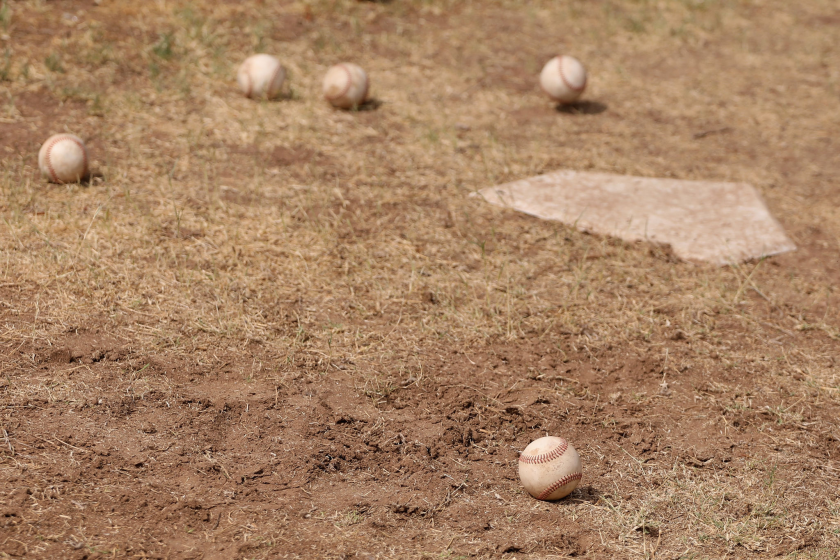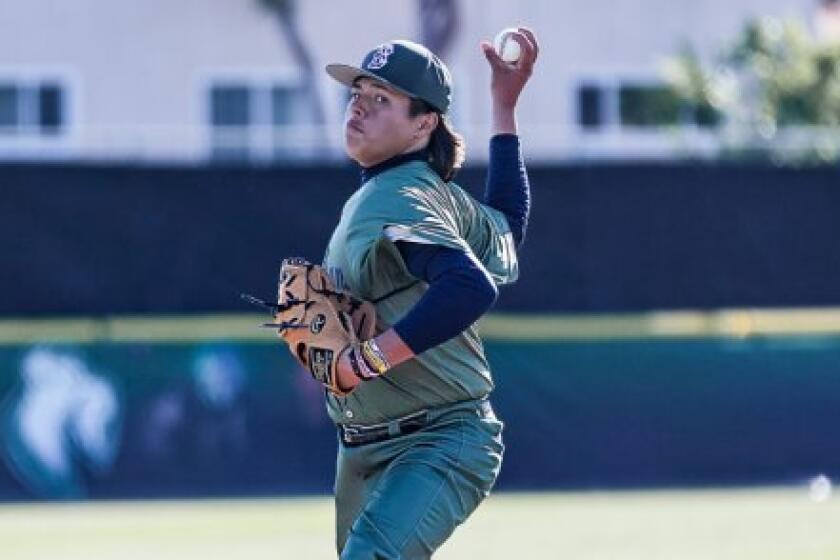Thrill of Victory Is Academic for Morse Football : Education: High school gridiron champs tackle studies to excel off the field as well.
- Share via
Morse High School junior Gary Taylor fidgeted noticeably during a special meeting of several football players the other morning called by coach John Shacklett to talk about academics.
Toward the end of the hour, Taylor could hold back his nervousness no longer. He asked for permission to return to physics class in order to hand in the daily assignment due at the beginning of the class period.
Taylor was only partly reassured by Shacklett that the coach would explain the circumstances to his physics teacher.
But Taylor’s preoccupation with his homework drove home the point that the school’s players share Shacklett’s insistence on putting academics above athletics, in-season or off-season.
The powerhouse Morse football team this past fall had more than a mission to repeat as the San Diego Section large-schools champion. Team members at the Paradise Hills campus also wanted to show that athletes, particularly those from a school where 88% of the students are members of a minority, can excel in the classroom as well.
To that end, team members not only pursued their own studies in a serious manner but offered positive peer pressure to colleagues, informally as well as during daily mandatory study hall before school.
“I think that, for the team, doing well in school is not even a question or issue to (think) about,” said senior linebacker Angelo Henry, a state science fair winner and a member of the school’s moot court team who is headed either for USC or the University of San Diego as a pre-law major.
“At this school, it’s a responsibility.”
Its reputation has even gained the attention of schools Supt. Tom Payzant, who called the efforts at Morse an outstanding example of what students and teachers can accomplish together.
Despite the racially tinged verbal taunting that a nonwhite team like Morse received on the line of scrimmage during the season, the remarks of Chula Vista High players bothered them most, Henry said.
“The Chula Vista players were saying that our teachers cheat for us” so we can remain eligible, Taylor said.
“I guess partly they said that because of the image of Morse and the fact that they’re athletes as well who maybe don’t do well (academically), so how can we do it?” wide receiver Tommy Bennett, a senior headed for UCLA, said.
Even senior Keith Hansen, the team’s punter and a non-resident white student who attends Morse because of its math-science-computer academic magnet, expressed surprise at the academic emphasis when he joined the team last year.
“I knew some of the guys before I joined the team, but I didn’t know that all of these guys were trying to study the way they do,” Hansen said. “I guess maybe I conformed to the negative stereotypes . . . but I can tell you that nothing is a gift at this school--if anything, the academic program is tougher than elsewhere.”
Shacklett, who also heads recruitment for the magnet, said there has been a trend toward stronger academics among his teams for several years and that the basis goes back to the 1970s when, as principal, the late George Frey established a minimum C average for eligibility long before it was adopted districtwide.
“Even my assistant coaches also teach academic classes such as (math and social studies), and they view that side as just as important as winning a game,” Shacklett said. “I’ve always wanted to prove that there was a place for athletics and academics, in part because I was told long ago that I couldn’t be both a good coach and a good teacher.”
Shacklett has each player stand up during the first team meeting each season and tell what he will do specifically to help the team academically. Senior Andrew Pangelinan, headed to one of the nation’s military academies, said assistance is available to every student who needs it.
“Obviously, every group has its strengths and weaknesses year-by-year, but this year the players really reinforced the attitude,” Shacklett said. Only one player became ineligible academically during the season, he said.
“And I was impressed by the intensity of how upset the rest of the players felt when they learned about the (student) who was ineligible,” he said. The team felt that it had been let down after all the tutoring and other help that members had offered the player, several players said.
Teachers at Morse treat players no differently than they do any other student, senior John Moe, who will be at the U.S. Naval Academy next fall, said. A 2.9 is still a C no matter how close it comes to becoming a B grade, he said. (Traditionally, an athlete’s grade might be rounded to a B by coming so close to that grade, especially if it were to make the difference between eligibility or ineligibility for a sport.)
“There’s no condescension here,” Bennett said, buttressing Shacklett’s philosophy that, although every teacher at Morse will have the time to stop and talk with any student, they are not surrogate mothers or fathers but rather “people who are straight with the kids, who hold them to high standards and don’t make excuses for them.”
In fact, the students say the three words they dread most from teachers are, “I’ll tell coach.”
Junior David Mallory, with a penchant for geometry and biology, said, “I’d rather go through hard classes than just learn how to run a cash register at McDonald’s.” Mallory juggles athletics, academics and a strong dose of family responsibility as an oldest child, Shacklett said. “It’s not easy for a lot of these kids.”
Bennett, Taylor and several other players serve as role models for neighborhood African-American children through tutoring sessions and by sponsoring activities through the Morse “Gentlemen of Quality” club.
“I’d like to see us have an effect,” Bennett said. “Colleges (recruiting us for football) would see my transcripts and be surprised that we did so well. . . . But we’ve had it drummed into us that we’re not always going to have athletics to be successful at . . . and I’m very proud that we haven’t had to go through the ‘back door’ or a junior college to be eligible.”
Teammate and close friend Teddy Lawrence, who chose UCLA over Stanford last week, echoed Bennett, saying “people at Morse, teachers and students, care about each other . . . . It’s important that people care.”
Lawrence still remembers the times that counselor Amelia Martinez at Bell Junior High told him in the seventh grade that he needed at least a 3.0, or B average, for admission into a good college.
“Before that, I was just thinking about how to get by with a 2.0 (C),”he said. “I made it a personal goal for me to get good grades and get into a good school.”
More to Read
Get our high school sports newsletter
Prep Rally is devoted to the SoCal high school sports experience, bringing you scores, stories and a behind-the-scenes look at what makes prep sports so popular.
You may occasionally receive promotional content from the Los Angeles Times.






